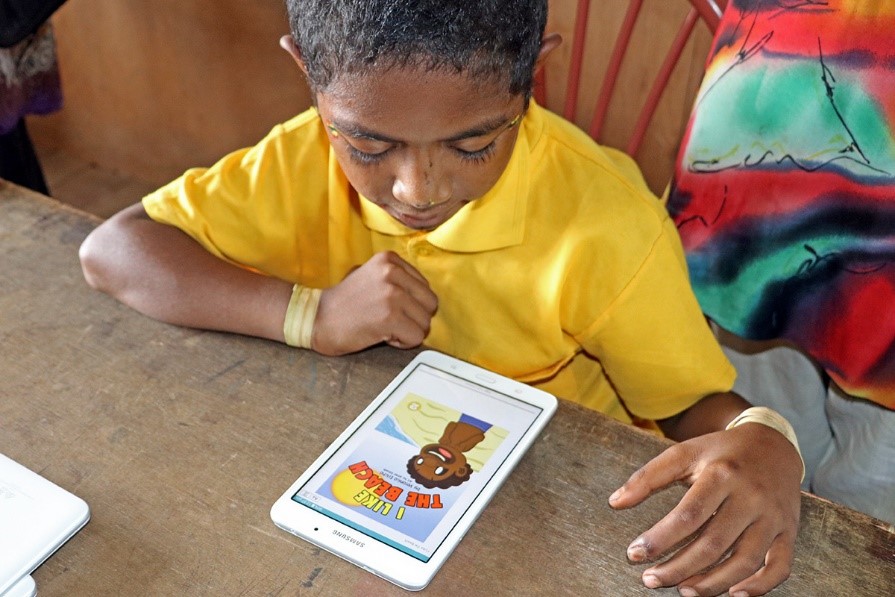Technology is a powerful tool that can support and transform education in many ways, from making it easier for teachers to create instructional materials to enabling new ways for people to learn and work together. With the worldwide reach of the internet and the immensity of smart devices that can connect to it, a new age of anytime anywhere education is dawning.
Technology has impacted almost every aspect of life today and education is no exception. Through the
PNG-Australia Partnership Papua New Guinea’s school children are experiencing the benefits of using education technology first hand to support their learning as well as understanding more broadly the digital future of Papua New Guinea.
A special edition of the APEC 2018 Discussion series on “Papua New Guinea and the Digital Future” held in October, saw Grade 11 students come together to discuss with experts on themes such as rural infrastructure, the impact of technological advancement on the labour market, digital infrastructure and literacy challenges.
While playing host to the Papua New Guinea and the Digital Future discussion, the country is also seeing new technology making its way into elementary schools. Selected elementary schools across 10 provinces are privileged to be pioneers of an Australian Government supported initiative that provides electronic story books for children written by Papua New Guinean authors.
Gretel Matawan, content coordinator for Library For All said “We have selected six rural schools in 3 provinces to trial the e-library application and we will also train teachers on how to use the technology. “The aim is to increase access to literacy and numeracy and learning for children.
The e-library application was developed by Library for All, a partner in the Together for Education project an initiative of the Australian Government. The application is called “Library For All” and is designed to be used in low-bandwidth environments using low-cost tablets and mobile phones.
The e-library is pre-loaded with over 100 culturally relevant e–books that contain stories and pictures of local people and places, festivals, flora and fauna which reflect the everyday life and culture of PNG. These books are easy to read and understand as children can easily relate to the stories.
Pinu Elementary School in Kairuku District, Central Province, is one of the six schools to trial the Library for All e-library application using tablets. Head Teacher, Rose Ovia, is positive the use of technology can support improved literacy skills.
“Providing literature at children’s fingertips gives them the drive to learn how to read. I hope this initiative will boost the reading levels of our elementary school students,” said Ms Ovia.
The e-library has also impressed parents, with Theresa Allan, a mother of one of the students at Pinu Elementary, reporting that her child found the application to be simple and easy to use.
“Reading a story from a tablet makes it easier for my child,” Ms Allan said. “I am happy because I know he is reading and learning.”
The PNG-Australia Partnership is also supporting the Summer Institute of Linguistics (SIL), a partner in the Rapidly Improving Standards in Elementary project to develop and roll-out a similar e-library application to selected schools in 3 additional provinces.
The “Bloom Reader” is another e-library application that has similar features to the “Library for All application and contains more than 50 decodable stories preloaded onto tablets. The stories are written in 30 different local languages including English and Tok Pisin. The children are enjoying reading the books because the stories reflect their everyday lives. All the stories are written by Papua New Guinean authors.
Teachers are also receiving training on how to use the tablets to support their students learning. Each school was given a kit to assist with delivering of literacy and numeracy lessons.
Reverend Peter Frost from SIL said the kits can be used in the classroom to assist teachers to deliver effective literacy and numeracy lessons.
“The kits include an Android phone with a preloaded Bloom Reader application and a speaker that can be connected to the phone and also a projector. When the phone is connected to the speaker and the projector, the teacher can have the application ‘read’ the story,” Rev Frost explained.
“The battery for the entire kit was custom built and can connect to solar panels for recharging using our special connector,” said Rev Frost.
The roll-out of the new technology has been planned to ensure that digital content and learning tools supplement traditional learning methods and are in line with the Department of Education’s Standard Based Curriculum.
The Library for All and Bloom Reader applications are available to download free to Android devices using Google Play. Type either Library For All or Bloom Reader in Google Play Store, click the icon and then tap the install tab. The applications will than start downloading to your device.
Together for Education is delivered by World Vision and its partners Library For All, Child Fund, Consultative Implementation and Monitoring Council and the University of Canberra. The Rapidly Improving Standards in Elementary is implemented by Save The Children and its partners, SIL and Callan Services for Persons with a Disability National Unit. These initiatives are supported by the Australian Government in partnership with the Government of Papua New Guinea.
For further information, including access to related materials, please contact the Australian High Commission media team: +675 7090 0100


